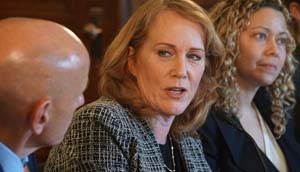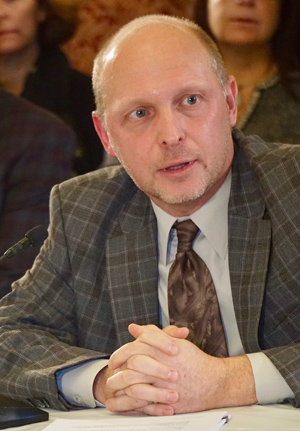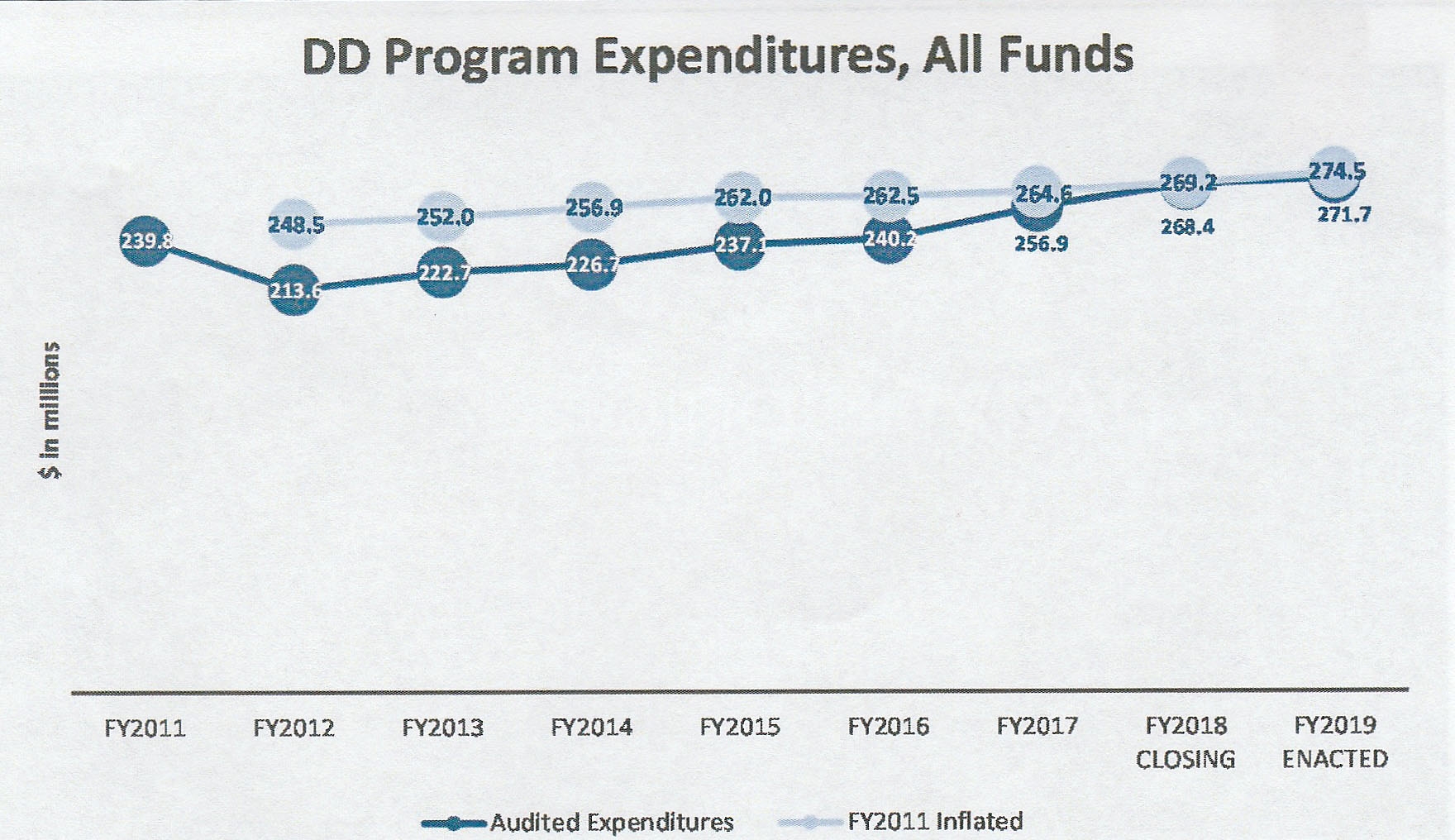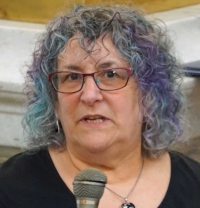NESCSO Will Not Offer “Magic Number” on RI DD Rate Review, Leaving Decisions To BHDDH
/Rick Jacobsen *** All Photos By Anne Peters
By Gina Macris
A consultant to a regional consortium reviewing Rhode Island’s developmental disability service system outlined the scope of the group’s work and time line to a July 30 meeting of a special legislative commission.
The consultant also disclosed some preliminary findings about “Project Sustainability,” the fee-for-service reimbursement system also being studied by the General Assembly’s commission. No one appeared surprised by the early findings.
For example, the developmental disabilities caseload has had a compounded annual growth rate of 3 percent in the last five years, from 3,744 to a current total of 4,297.
And the data shows that the private agencies that provide most of the direct services – and bear the brunt of the work necessary to comply with a federal civil rights agreement - operate on precarious financial margins.
The presentation to the Project Sustainability Commission was made by consultant Rick Jacobsen and his boss, Elena Nicolella, executive director of the New England States Consortium Systems Organization (NESCSO), a non-profit group that provides analysis in the fields of health and human services to five states. The meeting was held at the Arnold Conference Center at the Eleanor Slater Hospital.
Nicolella and Jacobsen encountered pushback when they explained the role defined for NESCSO by the state Department Behavioral Healthcare, Developmental Disabilities and Hospitals.(BHDDH).
NESCSO will present options to BHDDH for system improvements toward the project goal of maximizing “opportunities for people to fully participate in their community,” according to a Powerpoint presentation that accompanied the talk. But it won’t deliver an independent recommendation or “magic number” on costs, Jacobsen and Nicolella said.
Tom Kane, CEO of AccessPoint RI, a private provider, said long experience in system-wide reform has taught him that the approach chosen by BHDDH is doomed to fail unless the effort also states the true cost of evolving to an integrated community-based model.
L. to R.: Andrew McQuaide, Kim Einloth, Tom Kane
There has been no “tolerance” for even “having a (public) discussion about the cost of investing in the change process,” said Kane. “If you shift funds in an underfunded system, it’s not going to work. It’s just going to make the hole deeper,” he said.
In the 1980s and 1990s, when advocates pushed to close the Ladd School, the state’s only institution for people with developmental disabilities, “there was a community behind us, and we put an investment in the system in order to make that change happen, and it was dramatic change,” Kane said.
But there was no investment in changing the system in Project Sustainability, enacted in 2011, Kane said.
While the healthcare consultants Burns & Associates recommended an investment that was millions of dollars more than was being spent, Kane said, that number was never made public or discussed in the General Assembly. “What we ended up with was millions of dollars cut,” he said.
A few years later, when the demand grew for more community-based services, those reimbursement rates increased, but rates for center-based care decreased, despite the fact that providers continued to have the same fixed costs, Kane said.
The history of Project Sustainability has prompted a certain amount of “agida” among service providers regarding NESCSO’s work, said Andrew McQuaide, a Commission member.
“Having gone through a similar process and getting an end product that turned the system around and took us backward,”he said, providers are nervous that “we could go through a very similar process and come up with a poor product.”
He said his remarks did not reflect in any way on the current administration. Rebecca Boss, the BHDDH director, and Kerri Zanchi, the director of the Division of Developmental Disabilities, are both commission members and attended the meeting.
McQuaide and A. Anthony Antosh, another commission member, both urged Boss to make public all the data and reports produced by NESCSO, whose contract runs through June, 2020.
Antosh said there ought to be a direct relationship between the goals of the rate review and the recommendations of the commission. Commission members have submitted individual recommendations, which all advocate for the self-determination of adults with developmental disabilities. Their work will be synthesized into a final report, according to the commission chairman, Sen. Louis DiPalma, D-Middletown.
The manner in which NESCSO’s work will be shared with the public is under discussion, Boss said. She and Zanchi said they didn’t think it would be the best use of everyone’s time if the public discussion got bogged down in the minutia of the analytics at each stage in the process.
“We don’t want to be pulled off course but be mindful of the project as a whole,” Zanchi said.
Jacobsen and Nicolella said that NESCSO intends to produce data to enable BHDDH to make both near-term changes and longer-term reforms.
Preliminarily analysis of the audited financial statements of 16 private provider organizations confirms that the system is operating on a very close financial margin, said Jacobsen.
Elena Nicolella
That’s not unusual, he said. Human services agencies across the country are in similar positions. At the same time, the tight finances mean the agencies may tend to be averse to risks like investing in system change or taking on new clients, Jacobsen said.
Jacobsen presented a preliminary analysis of audited financial statements from 16 provider agencies over the last two years, with tables organized according to the number of fiscal reports. The agencies were not identified.
For example, out of a total of 27 audited financial statements, 15 showed deficits and 11 showed surpluses. Of the 11 surpluses, 6 were less than 3 percent of revenues.
In another table summarizing 24 financial statements, 12 of them showed less than a month’s cash on hand at the end of the fiscal year.
And a third table on liquidity said that of a total 24 financial statements, only 4 had working capital to carry their agencies longer than 2 months. At the other extreme, 7 statements said their agencies had no working capital or were lacking up to two months’ worth at the end of the fiscal year.
Jaccobsen said the state has made advance payments to some struggling agencies, but these advances have been carried as liabilities on the books.
Commission members said that for some organizations with multiple sources of income, the agency-wide audited statements do not give an accurate picture of the fiscal margins in developmental disabilities.
Regina Hayes, CEO of Spurwink RI, and Peter Quattromani, CEO of United Cerebral Palsy, suggested that the financial picture is worse than it looked in Jacobsen’s tables and asked him to go back and look only at the income and expenses related to developmental disabilities.
Jacobsen said NESCSO will spend the entire month of August listening to providers. Engagement with consumers and their families is scheduled for September.
An analysis of earnings figures from the Bureau of Labor Statistics for May, 2018 indicated that the wages for direct care workers in Rhode Island are close to the median in comparison to other states. That doesn’t mean that agencies can hire and retain employees, Jacobsen said.
Here too, Jacobsen was asked to look more closely at the figures.
Louis DiPalma and Rebecca Boss
The commission chairman, DiPalma, said the figures Jacobsen used didn’t account for a raise the Connecticut legislature gave to all its developmental disability direct care workers to a minimum of $14.75. In Massachusetts, 30,000 people working as personal care attendants, including many working with adults with developmental disabilities, make $15 an hour, DiPalma said. And the figures Rhode Island reports to the Bureau of Labor Statistics put developmental disability workers in the same category as home health aides, who make more, DiPalma said. According to a trade association representing two thirds of private providers in Rhode Island, entry-level direct care workers make an average of $11.44 an hour. (They are soon to get raises.)
When Jacobsen mentioned that NESCSO plans to compare Rhode Island’s developmental disability services to those in other states, Kane, the AccessPoint CEO, said the consultants must make sure to include the amounts the other states spend on institutional care.
A comparison of community-based services among states does not yield a true picture of total state spending on developmental disabilities, since most other states also have institutions, Kane said. But Rhode Islanders who in other states would be institutionalized live in the community in Rhode Island instead, said Kane.
Jacobsen also presented other preliminary statistics:
There has been a 15 percent compounded increase in the number of people who direct their own programs in the last five years. NECSCO will look further at whether the increase has occurred by choice or whether it results from individuals and families being unable to find suitable services from agencies. “I suspect it’s a mix of both,” Jacobsen said.
Of a total of nearly $216.2 million in reimbursement claims paid by the state in the 2018 fiscal year, 51.4 percent was for residential expenses and 48.6 percent was for daytime services, case management, respite care, and independent living or family supports.
· In the category of daytime services, 4.2 percent, or nearly $4.5 million, was spent for employment-related and pre-vocational activities. Increasing employment is one of the main goals of the consent decree.






































